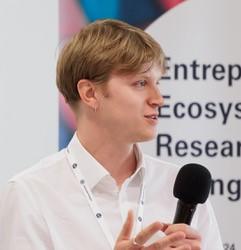Lukas Zaghow
Zaghow conducts research at Technical University Berlin on the organization and functioning of entrepreneurial ecosystems (EE) – an emergent concept in regional and urban studies for understanding enabling environments for entrepreneurship.
Sep 18, 2024
Beyond Berlin and the Silicon Valley, (regional) policymakers seek out new instruments for creating enabling environments for entrepreneurship. The ominous ‘entrepreneur’, among scholars and spatial planners, is of increasing interests as an agent in a more dynamic form of capitalism. Entrepreneurs foster the transition from a ‘managed’ economy characterized by legacy firms to an ‘entrepreneurial’ economy of dynamism and innovative small- and medium-sized enterprises (SMEs). In fact, “we are entering the era of the young firm” (Acs 2010). Such enterprises are considered reactive to the emergent problems of society, consumers and businesses – they may pursue both for-profit and non-profit objectives. In essence, entrepreneurs are both creators and disseminators of novelty into economic and social systems and therefore drive progress. A school of thought following the economist Joseph Schumpeter considers the entrepreneur the key exploiter of knowledge and places him*her at the core of economic activity, as generator, exploiter and disseminator of new knowledge. For many entrepreneurs, the innovation of products, services, processes or civic realities – in knowledge-based economies and societies – is a key objective.
Against this backdrop, economists with a spatial lens seek to explain differences in entrepreneurial activity and success between cities, regions and nation states. Why do some found an enterprise, while others don’t? Why do some achieve stellar success, while others don't? What structures and patterns are evident across different units (e.g., regions) or scales of analysis? In short: what makes some contexts for entrepreneurship better than others and how are such environments organized and functioning?
Correspondingly, an emergent research stream is concerned with the external enablement or the study of ‘contexts’ for entrepreneurship. As part of the dissertation project, Zaghow addresses these contexts via the entrepreneurial ecosystems (EE) concept trying to link how precisely agency of the entrepreneur and structure (entrepreneurial context) interact in entrepreneurial endeavors. The dissertation at TU Berlin’s Institute for Urban and Regional Planning aims to reconcile different levels of analysis (individual, organization, system) and explores the precise processes by which entrepreneurs are enabled/supported or hindered by their (regional) context. Therefore, the entrepreneurial ecosystem (EE), as complex interplay of actors, resources and processes is construed as a social construct in which the entrepreneur constitutes its focal agent responsible for converting the system’s resources into value creation. To such ends, the project collects and structures expert knowledge of EE intermediaries (e.g., incubator management, start-up coaches, industry and innovation policymakers) and entrepreneurs concerning specific cases of regional and urban entrepreneurial ecosystems (A. Ruhr Area – B. Berlin’s higher education institutions and Adlershof science park as anchors). In innovative fashion, the expert interviews are substantiated by additional methodological elements (e.g., tripartite interviews, scenario and problem-oriented workshops, participant observation).
Zaghow instrumentalizes the entrepreneurial ecosystem as a window into entrepreneurial realities and as lens for viewing and improving contexts for entrepreneurship – a novel approach linking learnings from management studies to EE measurement and qualification. Integrating the contributions of previous planning concepts such as ‘innovation systems’, ‘clusters’ or ‘industrial districts’, the EE promises to advance toward a holistic understanding of the mechanisms underlying successful entrepreneurship. By leveraging these insights, his research is to inform policymakers who, in turn, may tailor interventions and policies creating environments conducive to entrepreneurship – ultimately spurring job creation, technological advancement, and sustained economic progress.
Beyond such tangible upside, the EE thus stands to shape implicit assumptions and presuppositions about how economic aggregations function for the coming decades.
In impacting real-life, lived economic environments, the EE perspective allows for gathering a more nuanced reflection of the conditions of entrepreneurial action, which are directly addressable through policy action. By consequence, EEs concern and affect everyone due to the multi-level character of governance on (supra-)national, regional and local levels. EE research will, in time, increase the effectiveness of policy interventions and public expenditure (e.g., industry and innovation policy priorities, research policy) and improve the lackluster exploitation of knowledge resources (e.g., patents as part of dissertation projects in natural sciences) for technological and economic progress.
In a nutshell, the entrepreneurial ecosystem is truly en route to becoming the stand-alone guide, paradigm and reference scheme for “envisioning, thinking and talking about” entrepreneurship and the complexities of regional economic systems. The dissertation advances entrepreneurial ecosystems as a topical paradigm for conceiving regional economic activity in four domains: (1) it applies and empirically tests underlying assumptions about EEs in specific cases, (2) it extends the domain’s methodological arsenal, (3) it contributes to (spatial) theoretical discourse on EEs and (4) operationalizes and forms the fuzzy EE concept into an actionable tool for analytical and policy-making purposes addressing research community, (regional) policymakers and entrepreneurial practice.
Further Information
Lukas R. Zaghow is an Elsa Neumann fellow and doctoral researcher at Technical University of Berlin. He earned his degrees in Management (M.Sc.) and European Studies (M.A.) at Ruhr University Bochum, while attending universities in Portugal, the U.S., Italy, Japan and Türkiye. Building on experience in organizational transformation and strategic management scholarship, he entered the domain entrepreneurial ecosystems (EE) research. He is concerned with spatialities under pressures for transformation and the explanatory power of entrepreneurial activity in (structural) change processes in agglomerations. The doctoral project considers the social functioning and relational organization of entrepreneurial ecosystems, previous work on EEs included specific notions of access, equity and evolution.
zaghow@campus.tu-berlin.de

